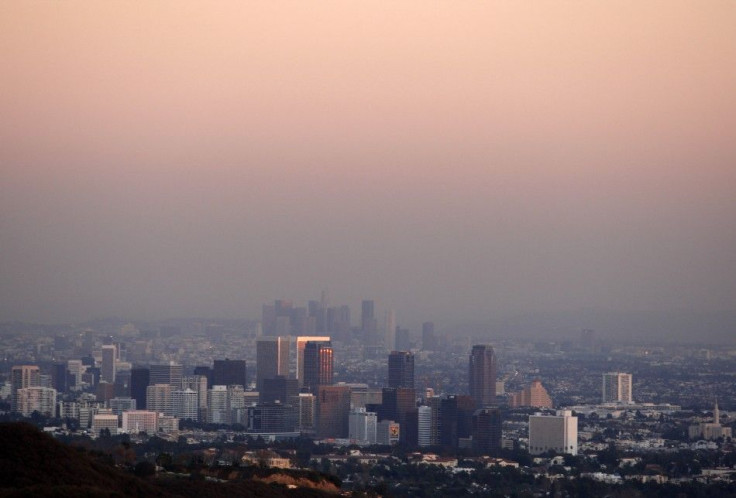Obama Backtracks on Smog Plan, Bows to Big Business

President Barack Obama put a stop on Friday to new rules that would limit smog pollution, unexpectedly reversing course on a key policy measure after businesses said it would kill jobs and cost them billions of dollars.
Obama said the decision to withdraw the draft Ozone National Ambient Air Quality Standard by the Environmental Protection Agency was part of an effort to reduce regulatory burdens for business.
The EPA has become a lightning rod for critics of government regulation and a hot-button issue for Republicans in the runup to the 2012 presidential campaign.
The move will be seen as another slap in the face for Obama's supporters on the left, a diverse group already concerned the administration has given in too quickly to big business and Republican pressure on debt-reduction and other issues.
The Obama administration is caving to big polluters at the expense of protecting the air we breathe. This is a huge win for corporate polluters and a huge loss for public health, said Gene Karpinski, president of the League of Conservation Voters.
Business groups and Republicans said the White House was making the right decision as the country's economy continued to struggle.
Opponents have argued the tougher regulations would cost thousands of jobs and purge billions of dollars from the bottom line of corporate America.
The president took a step today that highlights the devastating impact on jobs that has been created by this administration's regulatory overreach, said Mitch McConnell, the Senate's top Republican.
This action alone will prevent more job losses than any speech the president has given.
Obama's announcement followed grim data on Friday that showed U.S. employment growth ground to a halt in August, with the jobless rate stuck at 9.1 percent.
DEMOCRATS DISAPPOINTED
The EPA, under pressure from business and Republican lawmakers, delayed several times issuing the new rule that would limit smog pollution from power plants and factories.
Democrats in Congress called the White House's decision disappointing, and urged the administration to move aggressively on other clean-air challenges.
I am disappointed that the president chose to further delay important clean-air protections that would have helped to prevent respiratory and cardiac disease in thousands of Americans, said Ed Markey, the top Democrat on the House Natural Resources Committee.
Environmental groups worry Obama is backing away from promises to protect the environment. They are concerned the administration seems poised to approve the Keystone pipeline to import more oil from the Canadian tar sands, potentially boosting greenhouse gas emissions.
EPA Administrator Lisa Jackson, supported by a broad range of environmental groups, has said the ozone rules would save as much as $100 billion in health costs, and help prevent as many as 12,000 premature deaths from heart and lung complications.
Many MoveOn members are wondering today how they can ever work for President Obama's re-election, or make the case for him to their neighbors, when he does something like this, said Justin Ruben, Executive Director of MoveOn.org
Obama acknowledged the EPA plan could be revisted again in the future, noting the ozone standard would be reconsidered in 2013. Ultimately, I did not support asking state and local governments to begin implementing a new standard that will soon be reconsidered, Obama said in a statement.
In a call with reporters, White House officials defended the administration's environmental record, saying it would vigorously oppose efforts to weaken the EPA's authority or regress on progress.
This is not a product of industry pressure. This is a judgment of the merits, a White House official said.
SIGN OF THINGS TO COME?
The initial standards, proposed near the start of last year, would limit ground-level ozone, or smog, to between 60 and 70 parts per billion measured over eight hours. The proposal was stronger than the 75 parts per billion set by the Bush administration in 2008, which environmentalists blasted as less aggressive than government scientists had recommended.
Under the rule, factories and oil, natural gas and power generators would be forced to cut emissions of nitrogen oxides and other chemicals called volatile organic compounds. Smog forms when those chemicals react with sunlight.
Dow Chemical has said the rule could cost as much as $90 billion. Several companies including Dow have urged the administration to delay the rule until 2013.
Melissa McHenry, a spokeswoman with American Electric Power, said she hoped Friday's announcement would bode well for other regulations affecting coal power plants that are under consideration by the EPA.
It's good to see the administration recognizing the need to balance environmental rules with the potential impact on consumers and jobs, McHenry said.
We would hope that same consideration should be given to other rules that the EPA is moving forward with, she said.
© Copyright Thomson Reuters 2024. All rights reserved.




















